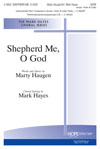- |
User Links
Shepherd Me, O God
Hymn Information
- First Line
- God is my shepherd, so nothing shall I want
- Author
- Marty Haugen, b. 1950
- Tune Name
- SHEPHERD ME, O GOD
- Composer
- Marty Haugen, b. 1950
- Topic
- Death and Dying · Jesus Christ: Shepherd/Good Shepherd
Copyright Information
- Text Copyright
- © 1986 GIA Publications, Inc.
- Tune Copyright
- © 1986 GIA Publications, Inc.
- Reprint/Projection Information
- Words and Music: Permitted with a license from OneLicense.net. If you do not own this license, please contact the copyright holder for permission.
Scripture References
Further Reflections on Scripture References
Psalm 23 is a song of confidence that proclaims one of the central truths in all of Scripture: in the midst of all trouble, we can remain hopeful and without fear because God, the Good Shepherd, accompanies us, leads us, defends us, provides for us.
Sing! A New Creation
Confessions and Statements of Faith References
Further Reflections on Confessions and Statements of Faith References
No hope is stronger than that expressed in Heidelberg Catechism, Lord’s Day 1, Question and Answer 1: we “…belong—body and soul, in life and in death—to my faithful Savior, Jesus Christ…because I belong to him, Christ by His Holy Spirit assures me of eternal life...”
The basic perspective of hope is expressed in Belgic Confession, Article 37 “…the Lord will make them (us) possess a glory such as the human heart could never imagine. So we look forward to that day (of Christ’s return) with longing in order to enjoy fully the promises of God in Christ Jesus, our Lord.”
Heidelberg Catechism, Lord’s Day 15, Question and Answer 42 clarifies what may be misunderstood when it says that even though Christ died for us, we still have to die, but “our death does not pay the debt of our sins. Rather it puts an end to our sinning and is our entrance into eternal life.” Additionally, Heidelberg Catechism, Lord’s Day 17, Question and Answer 45 explains that Christ’s resurrection “is a sure pledge to us of our blessed resurrection.”
Heidelberg Catechism, Lord’s Day 22, Questions and Answers 57 and 58 speak reassurances about the actual event of dying: “Not only will my soul be taken immediately after this life to Christ its head, but also my very flesh will be raised by the power of Christ, reunited with my soul, and made like Christ’s glorious body,” and “even as I already now experience in my heart the beginning of eternal joy, after this life I will have perfect blessedness such as no eye has seen, no ear has heard, no human heart has ever imagined: a blessedness in which to praise God forever” (Heidelberg Catechism, Lord’s Day 22, Question and Answer 58).
Our World Belongs to God, paragraph 56 summarizes our hope by testifying, “We long for that day when our bodies are raised, the Lord wipes away our tears, and we dwell forever in the presence of God. We will take our place in the new creation, where there will be no more death or mourning or crying or pain, and the Lord will be our light. Come, Lord Jesus, come.”
Shepherd Me, O God
Additional Prayers
Shepherd Me, O God
Tune Information
- Name
- SHEPHERD ME, O GOD
- Key
- f minor
- Meter
- irregular


 My Starred Hymns
My Starred Hymns






